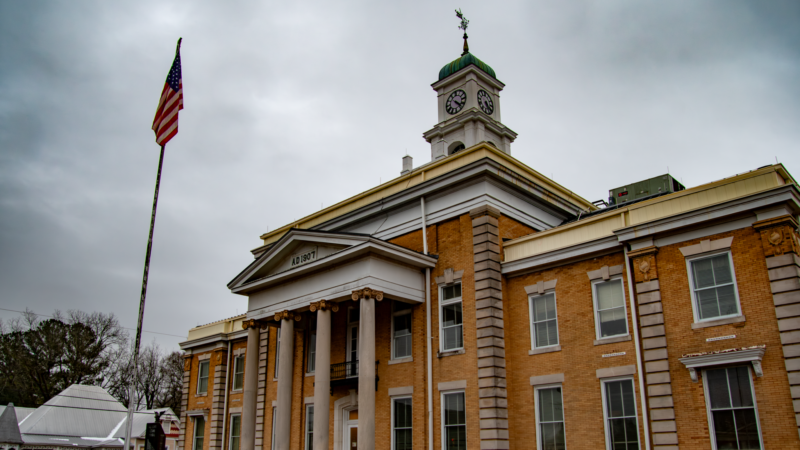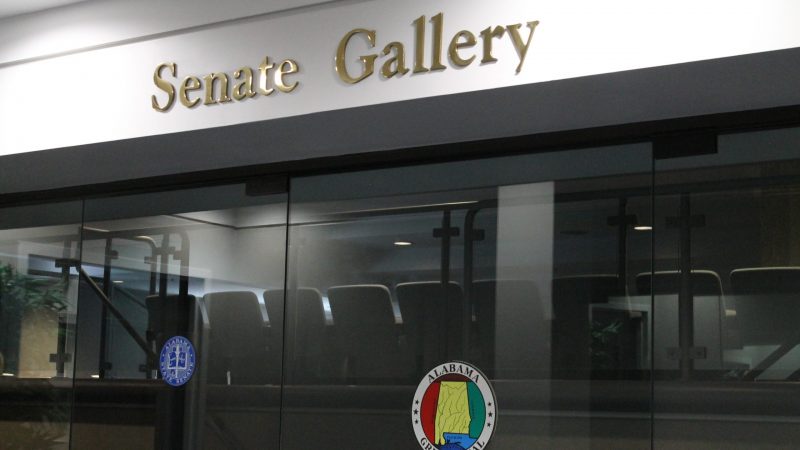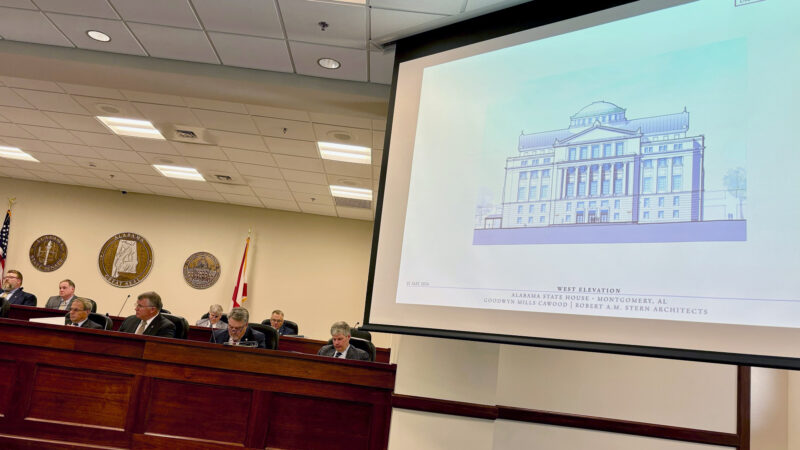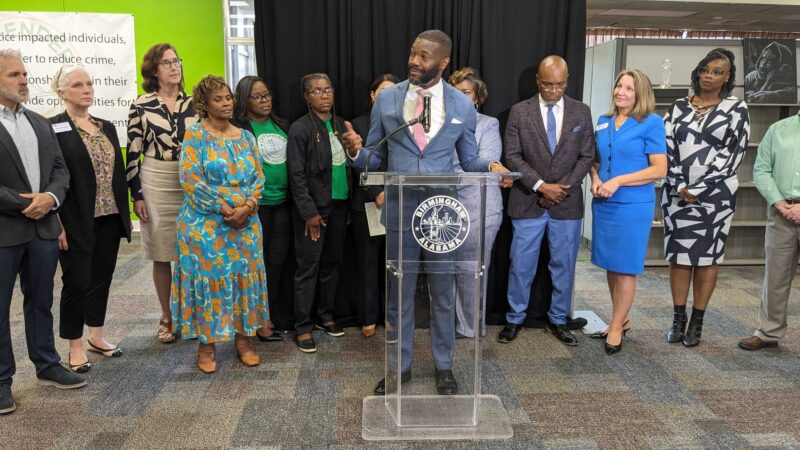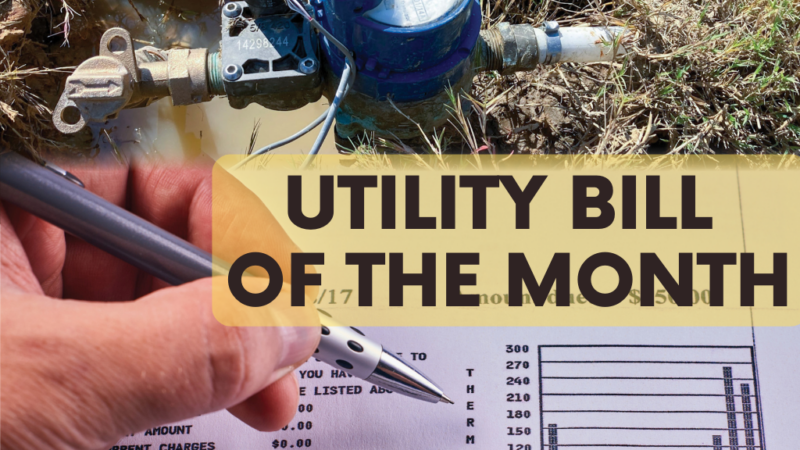Hale Freezes Over
Workers at the Hale County Courthouse in Greensboro, Alabama, have found themselves facing a choice: work in uncomfortable conditions or use personal time to avoid chilly inside temperatures.
This article originally appeared on Inside Climate News, a nonprofit, independent news organization that covers climate, energy and the environment. It is republished with permission. Sign up for their newsletter here.
By Lee Hedgepeth, Inside Climate News
GREENSBORO, Ala.—Judge Arthur Crawford wants Hale County residents to know. He doesn’t have water either.
The probate judge—the first African American to serve in the role in county history—told Inside Climate News on Thursday that dozens of families in Sawyerville, likely totaling hundreds of people in that small town alone, have gone without water for days, a product of inadequate pumping infrastructure worsened by a record-breaking hard freeze in the central Alabama county.
And that isn’t Hale County’s only problem. Crawford explained that because of the hard freeze and issues with the Greensboro courthouse’s heating system, local officials decided to rotate staff working in indoor temperatures he estimated to be in the 50s. Some workers refused, Crawford said, and county commissioners decided in an emergency meeting on Thursday that those workers would have to use personal time if they chose not to show up.
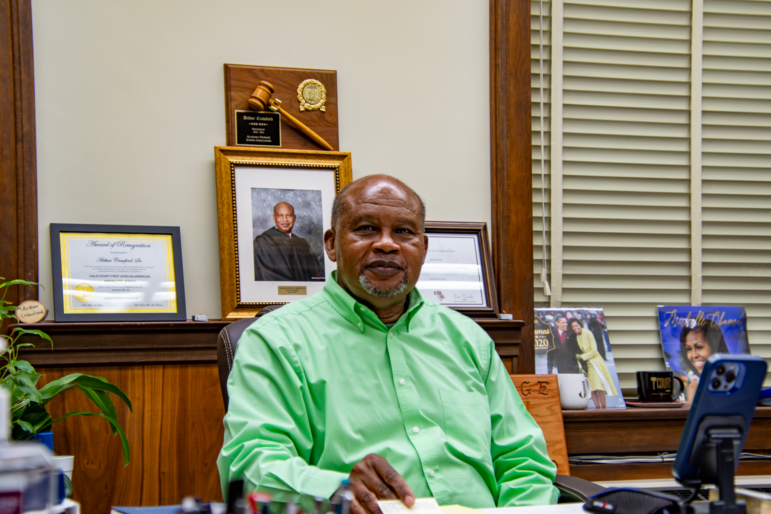
In nearby Demopolis, 110 miles south of Birmingham, separate water woes also left residents there with low or no water pressure, forcing a boil water advisory and leaving local schools closed on Thursday. There, the exact number of impacted residents is unclear, with officials unwilling or unable to provide any estimate.
The situation, residents told Inside Climate News, has left the community questioning the motivation and competence of public officials.
“It’s H-E-L-L county,” one resident said. “I don’t even call it Hale County anymore.”
Without Water
Odis McCalpine, 88, has lived in Sawyerville his whole life. On Thursday, he rose from his seat when he heard a reporter was at his door asking about the water.
“They don’t know what they’re doing,” McCalpine said of local officials. “But they need to get it together.”
For three days now, McCalpine and his family have gone without water. Only on Thursday did they receive bottled water from the local water authority.
The lack of water has meant changing habits to make way for a harsh reality, McCalpine said: no showers, no laundry, and no drinking water.
“It’s just stupid that you’ve got to pay your water bill when your water is off,” McCalpine said.
McCalpine said he remembers when the county installed water lines in Sawyerville decades ago. Officials encouraged residents to fill their wells and rely on water service, he said.
“You won’t need no well water,” he remembers being told. “And now here we are.”
Multiple efforts to reach officials with the Hale County Water Authority were unsuccessful Thursday. A representative who answered the authority’s customer service line said that no one was available to speak with the press.
“Everyone is out working emergency calls right now,” the representative told Inside Climate News.
As of Thursday evening, despite the widespread water issues across Hale County, population 14,754, the water authority listed no notices or alerts on its webpage dedicated to such announcements.
Crawford said he’s been answering calls and messages from residents since the water issues began, but he understands people are frustrated. Many of those impacted by the water issues have dealt with similar problems in the past, he said.
According to Crawford, the recent water issue in Sawyerville had begun before temperatures dropped below freezing. Because of inadequate pumping infrastructure, the water authority sometimes has difficulty getting water to residents who live uphill from towers. It is a longstanding problem, Crawford said, that was compounded when pipes began to freeze across the county earlier this week.
Research has linked extreme cold weather in the United States to Arctic warming driven by climate change. As the impacts of climate change worsen and the atmosphere warms, freezing temperatures will paradoxically occur more frequently in areas further toward the equator. The impacts of climate change—freezing temperatures in the winter, scorching heat in the summer, increased precipitation and more flooding throughout the year—will only increase the infrastructure challenges of places like Hale County in the state’s so-called Black Belt. Civil rights leaders and environmental activists have long questioned whether the predominantly African-American communities in the region, originally named for its rich black soil, have been adequately funded by state leaders.
Because of the “perfect storm” of circumstances, dozens of families in Sawyerville have been without water for days, Crawford said. A quick fix isn’t in the cards, either. Crawford said that county officials have spoken with the contractor who deals with water maintenance but that those conversations haven’t yet led to any guarantee of a rapid correction. As pipes thaw, Crawford said, residents’ water pressure should slowly increase. The pumping issue, he said, is a larger problem that warmer weather simply won’t fix.
Boil Water or Bust
Sawyerville’s problems aren’t unique. In Demopolis, water officials announced Wednesday afternoon that water pressure in the town of 7,000 people would be low or nonexistent.
“Demopolis water levels are very low and customers may be without water,” the City of Demopolis posted on its social media page. “Please turn off dripping faucets during the day. Check for leaks and conserve water. We hope to have well 2 back running today but we will still have very low levels for the next few days.”
By Wednesday evening, officials had issued a boil water notice due to the water pressure issues. The problems caused schools to remain closed Thursday, a day after most area schools had returned in the wake of closures to icy roads.
By Friday, residents in Demopolis had taken to social media to voice concerns about the lack of communication between officials and the public.
“Leadership in this city needs communication training (a lot of it) and this water issue is just the latest example,” resident Jason Cannon posted on Thursday. “Telling everybody ‘repairs for the well should be complete later tonight (Wednesday night)’ and ‘it could take several hours for pressure to get back up to normal’ infers that we could expect the Boil Water Notice to be canceled by this morning, if not overnight last night. 15 hours later, no one knows what the hell is going on.”
Thursday, water officials announced that “all wells are running as normal” but that a boil water advisory would remain in place until at least 5 p.m. Friday, pending water sample testing by the Alabama Department of Environmental Management (ADEM).
A Courthouse Quandary
On Thursday, Crawford said that county officials felt their hands were tied when it comes to forcing an immediate fix for the water issues in Hale County.
“When you receive a call, you would love to be able to fix it,” he said. “When you have external steps you have to go through, and you’re depending on someone else to do things, all you can do is wait.”
Crawford said that’s the case with the water issues, given that maintenance is contracted out and workers are waiting on pipes to thaw, and also the case with the county courthouse, which is facing frigid problems of its own.
Crawford said he doesn’t feel that asking workers to work a few hours in low temperatures is “outlandish.”
“Now, is it going to be the same level of comfort? No,” he said. “But we’re in the business of serving the public. You can’t just shut the courthouse down.”
Crawford said that county commissioners toured the courthouse this week to get a sense of working conditions. Officials decided to offer workers the ability to work four-hour shifts while being compensated for eight hours of work. Some refused, Crawford said, and commissioners decided those staffers would be required to use personal days to cover their absences.
Patricia Gooden works in the county courthouse. She said she felt like workers were being put in a Catch-22. The issues inside the building, she said, aren’t limited to winter.
“In the summer, the air was out,” she said. “Now it’s freezing with no heat.”
Crawford said he understood workers’ anger. He’s been told by the heating company that services the building the needed part was scheduled to arrive Thursday. That didn’t happen, but Crawford is hoping the part will arrive tomorrow. After that, the company has estimated around a two-day repair time before heat is restored.
Workers inside the courthouse dropped by Crawford’s office during a Thursday interview to check in before they left for the day.
“Do you have your key?” one asked.
Crawford nodded. Soon, he said, he’d head home to see if his own water was back on. He said he wants residents to know that county leaders are working to fix these issues, but that there are still obstacles to overcome.
“We can’t work magic,” he said. “But I encourage folks to call and let us know if they’re continuing to have issues. My door is always open.”
Gambling bill in doubt with three days left in the legislative session
Alabama lawmakers are coming down to the finish line for this year’s legislative session. Many bills await passage, but perhaps the biggest one up in the air is a lottery and gambling bill.
Pro-Palestinian demonstration draws counter-protest at University of Alabama
Students gathered demanding the school call for a permanent and immediate ceasefire and to push the school to sever ties with defense contractor Lockheed Martin.
A new Statehouse and related projects will cost about $400 million
The Alabama Legislative Council, a 20-member panel comprised of legislative leaders and their appointees, approved the construction of the new Statehouse last year. The panel was given an update on the project on Wednesday.
New pilot program will offer housing, resources to people leaving prison
The Birmingham Reentry Alliance will provide wrap around services to dozens of men and women adjusting to life after prison.
Alabama committee advances ban on LGBTQ+ pride flags in classrooms
The Senate Education Policy Committee voted 5-2 for the House-passed bill, putting the proposal in line for a possible final passage in the last four days of the legislative session.
A New Orleans garden paid hundreds of dollars in fees for a sewer that doesn’t exist
Galvez Garden owner Lissie Stewart has been fighting the New Orleans Sewerage and Water Board over inaccurate billing for years.
